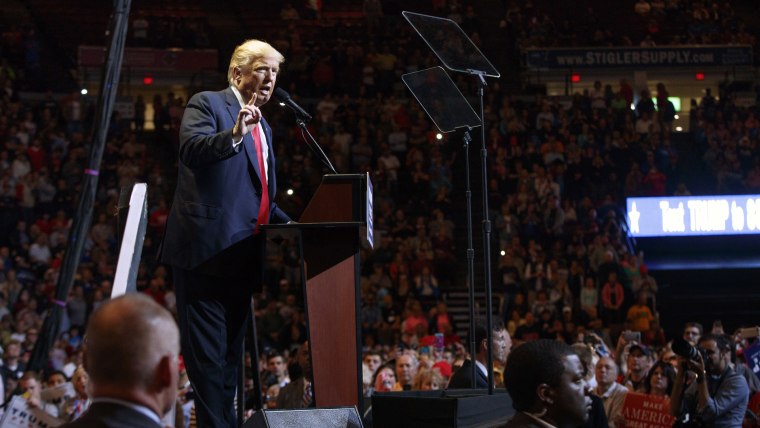In a preemptive strike against what it called a coordinated effort to intimidate voters, the Democratic Party's governing body alleged Wednesday that the Republican National Committee is violating a court order in a case that started 35 years ago.The RNC is supporting Trump's recruitment of so-called watchers at polling places, which is in breach of consent decrees going back to 1982 that forbid the group from engaging in ballot-security measures, according to a filing in federal court in Newark, New Jersey. The DNC said the watchers are really intended to deter registered voters from casting ballots.
I can appreciate why phrases like "breach of consent decrees" might make this story seem a little dry and complex, but stick with me because this one's going somewhere interesting. As Rachel said on the air last night, "This is a big deal."Some context is probably in order. In 1981, there was a very competitive gubernatorial race in New Jersey, which the Republican National Committee was eager to win. So eager, in fact, that the RNC launched a program called the "Ballot Security Task Force," which involved having Republican operatives and off-duty law enforcement personnel hanging around dozens of minority-voting precincts, looking for evidence of election irregularities, and intimidating local voters.The campaign was not subtle: Republicans put up warning signs, telling locals that their precincts were being monitored, and creating quasi-official arm bands for the party's monitors to wear while physically patrolling polling places in areas made up mostly of minority voters.In one sense, the heavy-handed scheme worked: the Republicans successfully intimidated people of color and narrowly won New Jersey's gubernatorial election that year. But the victory came at a price: the RNC's scare tactics were so outrageous, and the scheme targeted black voters so brazenly, that the Republican Party faced a court fight that they lost.The RNC felt compelled to accept a 35-year consent decree that included legal restrictions on the party's efforts to monitor polling locations. Republicans would love to get out from under these constraints, and party officials are looking forward to the decree's expiration next year.But that's where Donald Trump comes into the picture. By court order, the RNC can't dispatch officials to hang around polling places, intimidating minorities, but this year, the RNC's presidential candidate is doing exactly that -- pleading with Republican voters to serve as voting vigilantes on behalf of the Republican ticket, just like the party did in New Jersey in 1981.Not surprisingly, the DNC noticed, and Democratic lawyers headed to court yesterday to argue, in effect, "Hey, judge, remember that consent decree imposed on the RNC? Republicans are now violating it. Those restrictions that were supposed end next year? It's obvious they need to be extended until 2025."The RNC insists that it's honored the consent decree, but Trump's actions undermine the party's argument. As UC-Irvine professor Rick Hasen, an elections-law expert, has explained, the Republican National Committee is effectively having to go to court and argue that the party has nothing to do with its own candidate's campaign schemes.If judges reject the RNC's argument, an extension of the consent decree is likely. Watch this space.
